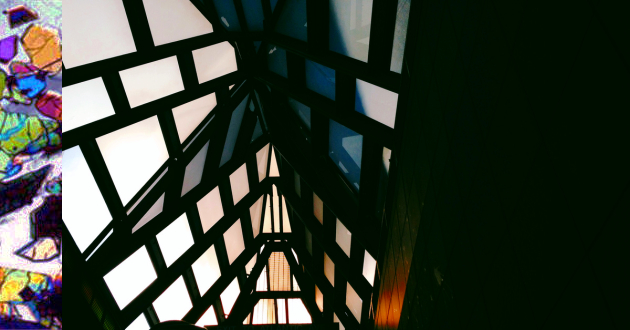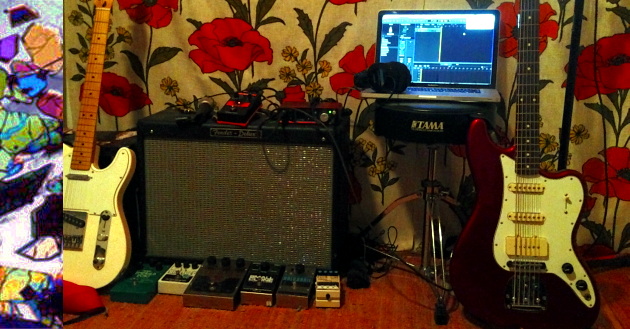
Did you feel like we left you hanging? We apologize for the delay, but a bunch of real-life stuff got in the way of our publishing this, the final installment of Sean Tracy's plunge down the time-sensitive cataracts in the songwriting challenge barrel we here at Clicky Clicky call Regolith. We think you are going to agree it was worth the wait, however. We are very pleased to be able to present to you today the fruits of Mr. Tracy's labor, which he is attributing to his project Dye (which, of course, we first told you about here in A2E1). It's an EP titled Alone, a particularly fitting moniker, as Dye typically includes Tracy's cohort Sam, but here of course, per Regolith rules, does not. The Alone EP contains five concise compositions touting gauzy rhythm guitars, gently perforating leads and bass work, a warm low end and spectral vocals. The short collection is shot through with a sedately stunned vibe, not unlike that of The Cure's 17 Seconds, but its compositions are more densely populated by guitars, hinting at Tracy's love of C86 and shoegaze sounds. Alone is eminently listenable, and while in the interview below Tracy expresses dismay at the quantity of material he was able to complete in 30 days, there is no questioning its quality. The EP is streaming at the Clicky Clicky Bandcamp page and also embedded at the foot of this post. Read and listen on. -- L. Tiburon Pacifico
Clicky Clicky: So how did it go? Do you consider the results a personal success? A failure?
Sean Tracy: It went all right. I feel pretty good about it, but there a ton of things that I wanted to do over [or] add. I wrote 12 songs and I'm turning in four-and-a-half, so...
CC: What were the biggest challenges and frustrations?
ST: The biggest challenge was definitely recording the vocals. Personally, I'm not someone who is much of a creative writer, so writing lyrics is typically something I dread/dislike very much. Just getting the time to record them was hard enough, but then getting vocal takes that I actually felt good about was a different story.
CC: How were you able to work around or overcome these challenges?
ST: I'd say the second thing is closer to what happened. I pretty much had to write stuff as I recorded it, and even while I typically do that, I would still have [other] ideas that were literally more thought-out than I had for this project. At the end, I had gotten to the point where I was having to write vocals/lyrics and guitar parts at the same time.
CC: What song do you think came out the best?
ST: That's a hard question, probably "17." I spent the most time on it, and gave it the most thought out of any of them. To me, it seems like kind of a weird one, but I was really happy with how the instrumentals came out, if nothing else.
CC: What song or songs do you wish you'd had more time to work on? Do you see yourself re-doing any songs in the future, in any of your bands?
ST: The song I wish I had more time to work on was "Ripped." Lots I wanted to try out for that one that I just didn't have time for. And... maybe? Not in the immediate future.
CC: Are there any songs you did for this project that you couldn't re-create live?
ST: I guess the answer to that is, um, all of them, at least not without at least 3 other people to play them with me...
CC: If there was one person or piece of equipment you could have brought in for the project, who or what would that have been?
ST: If i could work with anyone else I'd probably have to say my friend Sam Glassberg, who I used to be in a band with. I feel like we could probably have written a full album if that were the case.
CC: Did you learn anything about how you write and record music? What specific or quantifiable lesson, if any, did you learn that will help you in the future?
ST: I've learned that I tend to be pretty spontaneous, and that sometimes I have a hard time being my own editor. I guess that's why working with others is beneficial. Having multiple points of view is probably for the best.
CC: If you could travel into the future and speak with the next Regolith participant, what one piece of advice would you give them?
ST: Store all your project files in the cloud forever (I just lost my external HDD and my Macbook, within two weeks of each other. Still trying to get over that).
Normally here we'd tease the next Regolith artist-in-her-or-his-own-residence, but at this point we are still hammering down start dates and batting orders for some prospective participants. In the meantime, get cozy with Alone, and keep an eye out for news about the release of the debut full-length from Chandeliers, which Tracy referenced in A2E1. Chandeliers play a very hot bill in Boston June 7 at O'Brien's, along with Idiot Genes, Flat Swamp and Strange Mangers. We last saw Tracy performing with Bedroom Eyes at the incredible Soccer Mom record release show early this month (which, incidentally, seems like 1,000 years ago now), but Tracy has since left that band.
Previously:
Regolith A2E2: Sean Tracy Writes Songs Under The Gun
Regolith A2E1: Sean Tracy Is A Songwriter
Regolith A1E3: Reuben Bettsak Presents Emerald Comets' Inside Dream Room
Regolith A1E2: Reuben Bettsak Writing Songs Under The Gun
Regolith A1E1: Reuben Bettsak Is A Songwriter
Introducing... Regolith
 Sean Tracy likes to do it in the car... recording vocals, that is -- HEY-O! Welcome back to Regolith, Clicky Clicky's 30-day songwriting and recording challenge, wherein we con one woman or man of the indie rock persuasion to let us tag along and take an in-depth look at her or his creative process as they write and record new music from scratch. This is episode A2E2 -- that is "Artist Two, Episode Two" -- wherein Mr. Tracy gives us his mid-project update. You remember Sean, right? The guy who makes the bass noises for Boston anxiety-pop unit Chandeliers and New Hampshire/Boston shoegaze goliaths Bedroom Eyes? We covered all of that in A2E1, which, if you missed it, it's still online
Sean Tracy likes to do it in the car... recording vocals, that is -- HEY-O! Welcome back to Regolith, Clicky Clicky's 30-day songwriting and recording challenge, wherein we con one woman or man of the indie rock persuasion to let us tag along and take an in-depth look at her or his creative process as they write and record new music from scratch. This is episode A2E2 -- that is "Artist Two, Episode Two" -- wherein Mr. Tracy gives us his mid-project update. You remember Sean, right? The guy who makes the bass noises for Boston anxiety-pop unit Chandeliers and New Hampshire/Boston shoegaze goliaths Bedroom Eyes? We covered all of that in A2E1, which, if you missed it, it's still online